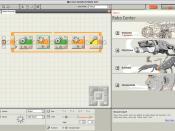Abstract
C++ has had a phenomenal growth since it's beginnings in the early 1980's and has taken it's place as one of the premier programming languages in use today. This paper examines the history, purpose and expectations of the C++ language and emphasizes the Object Oriented basis that has made C++ so popular.
Analysis Of The C++ Programming Language
Object Oriented Programming (OOP) is a software development paradigm that has passed the test of time. The key concepts if OOP, inheritance, polymorphism and encapsulation provide the programmer an abstraction that models the real world of objects or things. These key concepts came from simulation - the technology to simulate or model the real world in a computer. These concepts form the basis of the C++ computer language.
Origins
To find the origins of C++, one must travel around the world to a place that has spawned much original thought, Scandinavia, in particular, Norway.
Here in the early 1960's, Kristen Nygaard led a group of scientists in developing a radical new programming language (Holmevik, 1995) for simulation. This was to be "a precise language which allows a description of a network in terms of standardized and generally accepted concepts... where the flow may be thought of as being composed of discrete units demanding service at discrete service elements, and entering and leaving the elements at definite moments [sic] of time.". Today, this is known as encapsulation and is central to the idea of objects. The new language, called Simula, was based on the then leading European program language called Anglo, so that commercial acceptance would be more likely.
Later, Simula became a more general purpose language through involvement and money from UNIVAC. The developers realized that the language needed "tools for expressing common properties between interrelated processes in the system" (Holmevik,



Wow
wow very good very cool; good overview of the language and explainning how it works... very cool essay lol i have never seen anything like this before, mind pming me and telling me what class this is for? good job again!
4 out of 4 people found this comment useful.